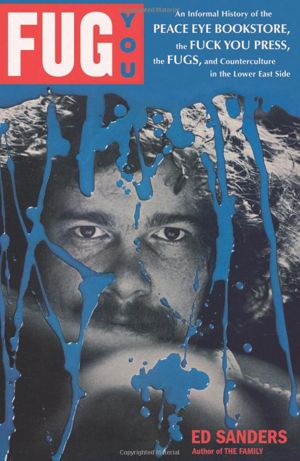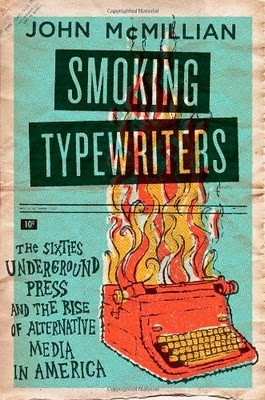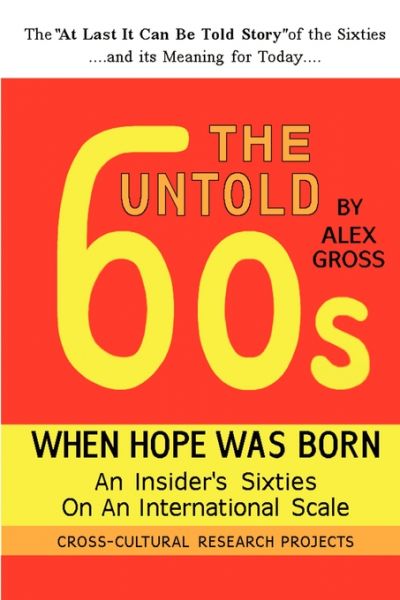 Three recent books each provide a prism on the matrix of the American counterculture in the 1960s underground press movement—with a particular focus on the germinal scene on New York's Lower East Side. Following the interlocking characters that passed through such institutions as the East Village Other bi-weekly and affiliated Underground Press Syndicate opens a window on a moment whose influence and significance have never received the recognition that the parallel scene across the continent in San Francisco's Haight-Ashbury won.
Three recent books each provide a prism on the matrix of the American counterculture in the 1960s underground press movement—with a particular focus on the germinal scene on New York's Lower East Side. Following the interlocking characters that passed through such institutions as the East Village Other bi-weekly and affiliated Underground Press Syndicate opens a window on a moment whose influence and significance have never received the recognition that the parallel scene across the continent in San Francisco's Haight-Ashbury won.
The first entry is a memoir by storied poet, radical and (briefly) rock star Ed Sanders, best known (with the late Tuli Kupferberg) as one of the driving personalities of The Fugs, and today a sort of countercultural elder statesman. If former secretary of state Dean Acheson called his memoir Present at the Creation in reference to the Cold War, Sanders could well have adopted the title in reference to the counterculture. Instead, remaining true to the scatological spirit of his youth, he calls it Fug You (Da Capo Press, Boston, 2011). The subtitle is "An Informal History of the Peace Eye Bookstore, the Fuck You Press, the Fugs, and Counterculture in the Lower East Side." It starts way, way back in 1962, with what Midwestern transplant Sanders calls the "Mimeograph Revolution" that allowed a whole new universe of small-press publications to come into existence on the cheap.
His own was the notorious Fuck You/A Magazine of the Arts—which was a crucial link between the old beatniks and the emerging hippies. It drew from Beat Generation luminaries like Allen Ginsberg and William Burroughs while bringing in political radicalism (ban the bomb, cannabis legalization) and an hallucinatory aesthetic. Lots of original art from this esteemed journal (and other such artifacts of the age) is reproduced in the book. Sanders' hand-drawn images from Egyptian mythology proliferate (he'd studied Greek and Latin at New York University)—but with obsessively crude sexual humor, erect dicks and spread pussies abounding. Four years later, this would get Sanders slapped with obscenity charges, and his Peace Eye Bookstore, in an old kosher meat market on East 10th St., raided by the police.
By then, Sanders has already led us through eye-witness accounts of history (Martin Luther King's march on Washington), some early glimmers of the peace movement (a sit-in at the New York headquarters of the Atomic Energy Commission), encounters with other artistic and social pioneers (the Living Theater's move from the stage to the streets), and the founding of the East Village Other—which likewise merged radical-left politics with a psychedelic sensibility. Still to come is the formation of The Fugs (and the group's rapid evolution from an off-beat local folkie act to youth-culture icon with an international following), the founding of the Yippies (Sanders presided as high priest in their 1967 "exorcism" ritual at the Pentagon to protest the Vietnam war), and the cataclysmic 1968 protests at the Chicago Democratic Convention (organized out of East Village crash pads).
 John McMillian's Smoking Typewriters: The Underground Press and the Rise of Alternative Media in America (Oxford University Press, believe it or not, 2011) looks at this same milieu through a dispassionate scholar's eye. His chapter on "The Great Banana Hoax of 1967" (the false rumor that the peels can get you high, sparking a wave of pointless youth peel-smoking) could have been better off as just a paragraph or two, but his remaining chapters are fascinating—on Students for a Democratic Society (spawning underground press efforts on campuses across the country), Liberation News Service (conceived as a wire agency for the youth culture), the East Village Other, and the government's campaign to shut down the underground press. (Sanders asserts not only the NYPD but the FBI and even CIA—in a special program called Operation Chaos—spied on, harassed and generally tried to sabotage the movement.) "Obscenity" busts—often for a degree of sexual frankness today taken totally for granted—were a key tactic. McMillian relates how Underground Press Syndicate co-founder Tom Forcade threw a pie into the face of the chair of the President's Commission on Obscenity and Pornography at a DC hearing in 1970.
John McMillian's Smoking Typewriters: The Underground Press and the Rise of Alternative Media in America (Oxford University Press, believe it or not, 2011) looks at this same milieu through a dispassionate scholar's eye. His chapter on "The Great Banana Hoax of 1967" (the false rumor that the peels can get you high, sparking a wave of pointless youth peel-smoking) could have been better off as just a paragraph or two, but his remaining chapters are fascinating—on Students for a Democratic Society (spawning underground press efforts on campuses across the country), Liberation News Service (conceived as a wire agency for the youth culture), the East Village Other, and the government's campaign to shut down the underground press. (Sanders asserts not only the NYPD but the FBI and even CIA—in a special program called Operation Chaos—spied on, harassed and generally tried to sabotage the movement.) "Obscenity" busts—often for a degree of sexual frankness today taken totally for granted—were a key tactic. McMillian relates how Underground Press Syndicate co-founder Tom Forcade threw a pie into the face of the chair of the President's Commission on Obscenity and Pornography at a DC hearing in 1970.
While McMillian ends with a discussion of "Alternative Media Trends Since the Sixties," he just briefly notes in passing that Forcade would go on to found High Times magazine!
 The final entry brings us back to the realm of memoir. Alex Gross' The Untold Sixties (published by the small-press Cross Cultural Research Projects, New York, 2009) takes more of an international view, although landing about halfway through back on the Lower East Side. The first chapters have New Yorker Gross vagabonding with his partner Ilene Astrahan (who contributes her own chapter to the book) around Europe—eventually serving as a correspondent covering the extremely militant West German student movement for a London youth-anarchist rag with the deceptively staid name of International Times. He also interacts with two other legendary underground newspapers from the east side of the pond, London's Oz (the focus of a high-profile obscenity case in 1971) and Amsterdam's Suck.
The final entry brings us back to the realm of memoir. Alex Gross' The Untold Sixties (published by the small-press Cross Cultural Research Projects, New York, 2009) takes more of an international view, although landing about halfway through back on the Lower East Side. The first chapters have New Yorker Gross vagabonding with his partner Ilene Astrahan (who contributes her own chapter to the book) around Europe—eventually serving as a correspondent covering the extremely militant West German student movement for a London youth-anarchist rag with the deceptively staid name of International Times. He also interacts with two other legendary underground newspapers from the east side of the pond, London's Oz (the focus of a high-profile obscenity case in 1971) and Amsterdam's Suck.
Gross notes the worldwide wave of youth protest in those years, and (facetiously, one hopes) suggests it could have been related to the sunspot cycle that peaked in 1968. The Cold War imposed seemingly contradictory ideological casts on the protests—communist-sympatheic protests in West Germany and France, anti-communist protests in Poland and Czechoslovakia, intra-communist protests in China (the "Cultural Revolution"). Yet the same fundamental impulse was common to them all—a youth revolt against those in power. Gross sees through this divide-and-rule dynamic—he's alienated by the totalitarian atmosphere when he ventures into East Berlin, enthused by the Prague Spring, and appropriately appalled at its repression by invading Soviet forces. He also waxes especially paranoid in his European chapters, claiming close encounters with CIA spooks sent to monitor and undermine the protest movements in the West.
Back in New York in 1968, Gross becomes a staffer at the East Village Other (ubiquitously known as the EVO), and joins a radical artists' collective that stages an occupation of the Metropolitan Museum of Art (to protest both the Vietnam war and bourgeois art). The beginning of the underground press being mainstreamed (or co-opted) is seen as the EVO moves out of its Ave. A offices into an upstairs space at Bill Graham's Fillmore East rock venue on Second Ave. (today a savings bank, where in one ironic reminder of the building's fabled past, a few framed psychedelic rock posters adorn the walls). The contradictions represented by this embrace were instrumental in the decline of the underground press—as was (in Gross' portrayal) intentional government-induced paranoia.
What did it all mean, and what does it mean for us today? Sanders stops his narrative cold in 1970. McMillian offers a final discussion on how the underground press transformed into the less openly oppositional "alternative press" in the '70s. Gross (who subtitles his book "When Hope Was Born") has a final chapter entitled "Is There a Sixties in Your Future?" He takes stock of the gains of the youth rebellion, and the prospects for a new generation to rekindle the flames.
This doesn't come across as just an old man's nostalgia. In Mark Twain's dictum, "History doesn't repeat itself, but it does rhyme." Gross published his memoir two years before the emergence of the Occupy movement and the Arab Spring—good signs that the planet is, in fact, heading towards an historical moment that rhymes with 1968...







Comments
Praise from anonymous reader
Not many blogs that offer such consistently readable and informative content as is on offer on yours, you deserve the time it has taken to express my admiration of your endeavours. Many Many Thanks.